最新九年级英语上册Unit4单元总复习课件 人教版
- 格式:pdf
- 大小:9.60 MB
- 文档页数:48


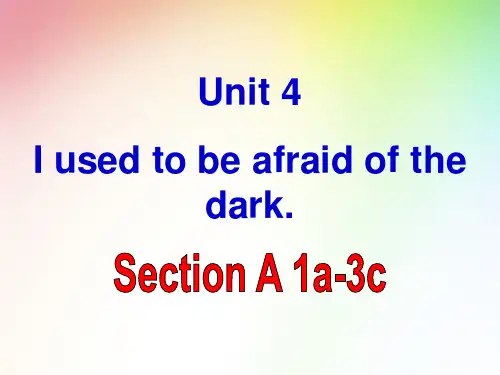
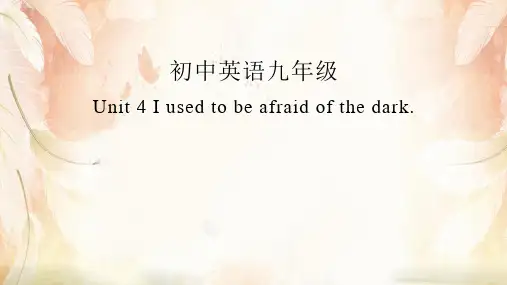

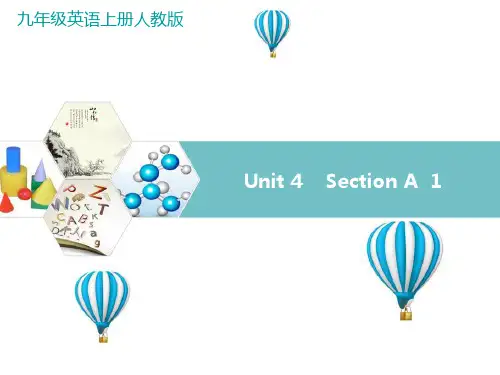

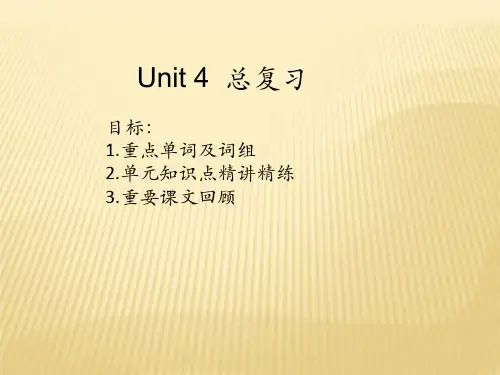

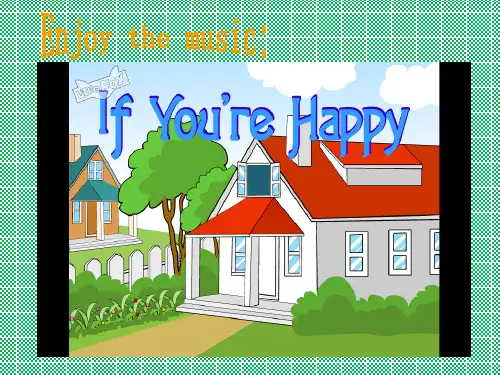
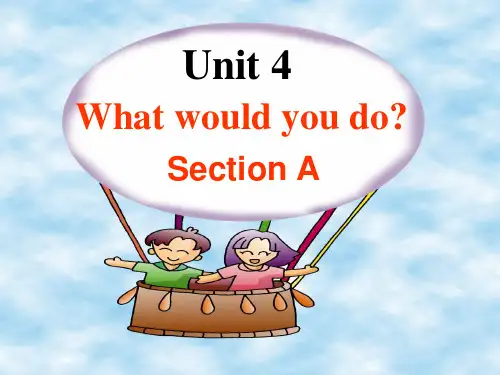
1. … you used to be short, didn’t you?(P25)本句是个反义疑问句,反义疑问句的特点是“前肯后否”或“前否后肯”。
回答反义疑问句和回答一般疑问句一样,如果答案是肯定的,用Yes+肯定结构;如果答案是否定的,用No+否定结构。
He can hardly stay awake because he is so tired. _______?A. does heB. isn't heC. can't heD. can he1. He _______ listen to pop music, but now he _______ dancing.A. is used to; used toB. use to; is used toC. used to; is used toD. used to; used to2. He used to _______ in the sun, but now he is used to _______ at night.A. read; readB. reading; readC. read; readingD. reading; reading3. He used to be short. (改为一般疑问句)__________ he__________ to be short?4. Her father used to get up late. (改为否定句)Her father__________ __________ to get up late.5. She______live alone. But she______living alone because she feels lonely.A. used to; doesn't used toB. is used to; was used toC. used to; is not used toD. was used to; doesn't used to2. What’s he like now? (P26)What's sb like “某人什么样?”或“某人是什么样的人?”,多用于提问人的性格、品质等,也可用于提问人的相貌。
What does sb look like?用于提问人的外貌,“某人长得什么样?”--- ______ is your classmate John like?--- He's very tall.A. HowB. WhatC. WhoD. Which3. She was never brave enough to ask questions. (P26)enough此处用作副词,“足够地,充足地”,用来修饰形容词或副词,置于被修饰词之后。
enough还可用作形容词,“足够的,充足的”,在句中作定语修饰名词,可置于名词前面或后面。
All the students in the classroom do their homework __________.A. enough carefulB. careful enoughC. enough carefullyD. carefully enough3. She was never brave enough to ask questions. (P26)adj./adv. + enough to do sth.“足够……可以做某事”。
so...that..., ...enough to ... 与 too...to...可以进行同义句转换。
The man is so old that he can't go to work.= The man isn't young enough to go to work.= The man is too old to go to work.4. It’s been three years since we last saw our primary school classmates.(P26) It is/has been +时间段+since从句 “自从……以来已经有多长时间了”。
since“自从,自……以来”,后接从句时,该从句常用一般过去时,主句常用完成时,且动词要用延续性动词。
My uncle has been teaching in this school _______ he was twenty years old.A. sinceB. forC. untilD. after5. Candy told me that she used to be really shy and took up singing to deal with her shyness. (P27)take up “开始;从事”。
take up doing sth “开始做某事”。
Jacky's mother was surprised to see her son ______ all the food on the table quickly.A. eat upB. look upC. take upD. give up5. Candy told me that she used to be really shy and took up singing to deal with her shyness. (P27)take off 脱掉;起飞 take away 拿走take in 吸收,领会 take down 记录;取下take back 收回 take out 带出;清除take pride in 以…为自豪 take the place of 代替…take turns to do 轮流做…5. Candy told me that she used to be really shy and took up singing to deal with her shyness. (P27)deal with“处理”,与how连用。
do with “处理”,与what连用。
deal with还意为“应付,涉及,论及”1. Jane is very busy these days, for she has a lot of problems to ______.A. deal withB. agree withC. keep up withD. come up with5. Candy told me that she used to be really shy and took up singing to deal with her shyness. (P27)2. — ________ did you ________ your pocket money?— I sent it to the children in Sichuan.A. What; deal withB. How; do toC. What; deal toD. How; deal with5. Candy told me that she used to be really shy and took up singing to deal with her shyness. (P27)3. 用deal with 或 do with填空。
Can you tell me how to _______ it?I really don’t know what to _______ it.4.用do with 和 deal with 翻译。
你怎么处理那台旧电视的?6. As she got better, she dared to sing in front of her class.(P27)1. I wonder how he ___ that to the teacher.A.dare to sayB.dare sayingC.not dare sayD.dared say2.The little girl ____ out in the dark at night.A.dares not goB.dare not goC.does not dare goingD.dares not to go6. As she got better, she dared to sing in front of her class.(P27)in front of与in the front ofin front of在……的前面强调在某一物体外部的前面in the front of在……的前部强调在某一物体内部的前面例:Cathy was just sitting in the front of the car when she saw her friend Mary standing in front of the car.7. ...you have to be prepared to give up your normal life. (P27)prepared 形容词,“准备好的” be prepared to do sth “准备好做某事”prepare to do sth.表示"准备做......"。
prepare 动词,“准备” prepare sb. sth. = prepare sth. for sb.“为…准备…” prepare for sth. “为……做准备”。
prepare sb. for sth.表示“使某人对某事有所准备”。
1. --- I find it difficult to learn English well. I want to drop it. --- English is very important in our daily life. Never _______.A. give up itB. give it upC. give away itD. give it away2. You shouldn't ______ your hope. Everything will be better.A. give upB. fix upC. cheer upD. put up3. You should really ______ smoking. It's a terrible habit.A. grow upB. pick upC. give upD. set up4. —What are you doing, Uncle Wang?—I am sorting out old books and I'll ______ to kids in West China. A. give them up B. give them awayC. give them offD. give them in5.— It's everyone’s duty to join the Clean Your Plate Campaign.— Sure. We should try to ______ all the food that we've ordered.A. give upB. eat upC. turn upD. show up8. being alone独处 (P28)alone形容词,“单独的,独自的”,不能用于名词前作定语。